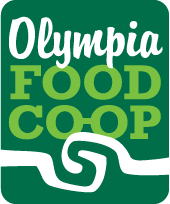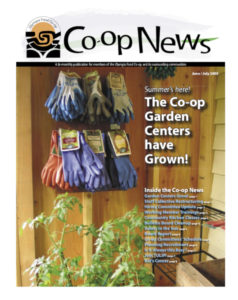Co-op News June & July 2005 PDF
THE CO-OP GARDEN CENTERS HAVE GROWN!
Summer is here, and nowhere are people more happy than in the coastal Pacific Northwest, where the winter (and spring and fall) usually consists of one long, gray rainy season. Now we get to reap the benefits of all that rain by enjoying lush plant life and moist soil. Although most of us may have started preparing our gardens in March or April, there is still plenty of time to put one in, and there are still many tasks left to amend the garden already planted. The Co-op’s garden centers are just the places for plants, products and tools to help you establish or enhance your gardens.
WE’VE REMODELED
The garden centers at both stores have recently been improved to provide more products and better access. The eastside store saw the actual creation of a small building right by the front door to house its garden products. This idea had been simmering for eight years or so and was finally completed by Kirk Trowbridge, a Co-op member, who built it on spare evenings and weekends. It is an attractive wood building that complements the existing store quite nicely. Now, instead of garden supplies being jammed into the produce section, one can find the tools, fertilizers and accessories laid out clearly. There is also room in which to store the plant cart at night.
The westside has been improved by the work of Erika Koltveit, also known as “the Norwegian Carpenter”. She added new shelf space to the existing area, which now has a removable shelf and will allow for storage of live trees. Although the remodel was not completed before fruit tree season, the Co-op plans to carry fruit trees and other seasonal trees from Burnt Ridge Nursery. Also, a new cart has doubled the amount of plant starts the westside can carry.
The remodels at both stores mean the Co-op will be able to increase the amount and variety of products it carries. At the eastside, this means carrying pallets instead of bags of peat moss free potting soils and organic fertilizers or adding more tools and accessories such as composting tools, clay pots and planter boxes, and hand tools like clippers and gloves. Also look for more perennials and hanging plant baskets because of the increased display room.
The westside store will continue to highlight edible plants such as: vegetable starts and herbs, organic fertilizers, com posting and garden tools, tree starts, and worm tea and castings from Wiser Worm Farm (also at the eastside).
BUY LOCAL, GARDEN LOCAL!
Both stores share a “buy local as much as possible (and organic of course)” philosophy according to Gary Galbreath and Patrice Barrentine, garden center managers of the east and west side stores, respectively. Gary raves about the Co-op’s relationship with Gary Kline of Black Lake Organics and his genius in cultivating organic, sustainable fertilizers. He recommends paying a visit to him at Black Lake Organics beyond purchasing his products at the stores. Patrice, also a co-manager of the produce department, talks excitedly about the close relationship we have with our growers of plant starts. This year she was able to request specific plant starts from Pigman’s Organics to fill niches that other suppliers may not cover. Spring Creek Farm, Stoney Plains and the Secret Gardener are other local farms that supply our plant starts.
The Co-op buys its seeds from Territorial Seed Company of Cottage Grove, Oregon. They have increased their stock of organic, biodynamic and heirloom seeds and remain a non-corporate company (unlike Seeds of Change, who is now owned by M&M Mars). Their seeds are also cultivated in our bioregion and are formulated for our growing conditions. Our garden accessories come from Down to Earth, a company based in Eugene, Oregon. They supply the Co-op with gardening and housewares such as chimes, potting soils, gloves and composting tools. The garden center managers are currently seeking alternatives to gardening tools made in China (keeping with a national boycott by food co-ops) but are finding it difficult to find, as well as maintain, a line of product that others will want to buy elsewhere at competitive prices.
The Co-op garden centers plan to offer products seasonally that will encourage shoppers to be able to garden all year ‘round. Look for winter garden seeds in July and flower and garlic bulbs (in 10 pound bags) in August and September.
The Co-op’s garden centers are not terribly large but they fulfill a part of our mission in encouraging local production and growing practices that are sustain able for the Earth. You can purchase sup plies here knowing that great care and thought goes into product selection and that many of the products are the result of many local farms and/or companies. Patrice says it well when she said,” we want to encourage people to take a small part in supplying their own kitchen while realizing the pleasure in that practice.” Check out our newly expanded garden centers and see how you can engage with the world of growing!
Co-op News June & July 2005 PDF

